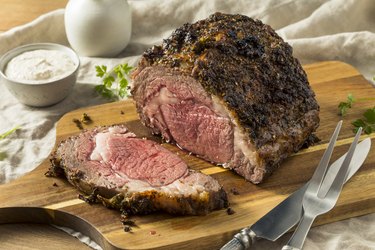
Prime rib, also known as standing rib roast, comes from the rib section of the cow. Prime rib is typically slow-roasted and served for special occasions, as it's one of the more expensive cuts of beef. It's also quite high in fat, so it's best eaten in moderation.
Here's an overview of the nutrition information for prime rib (for a 3-ounce serving):
Video of the Day
Video of the Day
- Calories: 298
- Fat: 24 grams
- Saturated Fat: 9.6 grams
- Protein: 19.2 grams
- Carbohydrates: 0 grams
- Cholesterol: 72 milligrams
Calories and Fat
Three ounces of prime rib contains 298 calories, more than half of which comes from fat. One serving contains 24 grams of fat, which provide 215 of the 298 calories. Of the 24 grams of fat in one serving of prime rib, 9.6 grams are saturated fat.
The American Heart Association (AHA) recommends adults consume less than 10 percent of their daily calories from saturated fat, which would be between 20 and 22 grams saturated fat calories for most adults.
The 9.6 grams of saturated fat in prime rib is close to half of the recommended amount for an entire day. If you're looking to cut back on saturated fat, you may want to choose a leaner cut of beef such as New York strip, which contains 7.5 grams of saturated fat per serving.
Cholesterol
One serving of prime rib contains 72 milligrams of cholesterol, which is 24 percent of the maximum recommended amount per day.
The AHA recommends limiting cholesterol intake to 300 milligrams per day, as excess cholesterol can build up on artery walls and lead to heart disease. The AHA recommends an even lower limit — 200 milligrams per day — for those who already have heart disease.
Protein
One nutritious aspect of prime rib is the high protein content. Three ounces of roast prime rib contains 19.2 grams of protein, which is between 29 and 35 percent of the dietary reference intake, or DRI, the recommended daily amounts for each nutrient.
Prime rib is a complete protein, which means it contains all nine essential amino acids. It's especially high in the essential amino acid threonine, which assists in the formation of connective tissue and is important for healthy liver function.
Minerals
Prime rib is high in many essential minerals, especially zinc. One serving provides 42 percent of the DRI for zinc for men and 57 percent for women, according to Medline Plus.
Zinc is essential for a healthy immune system and assists in carbohydrate metabolism. One serving of prime rib also supplies 21 percent of the DRI for phosphorus and more than 10 percent of the DRI for potassium and iron.
Vitamins
Prime rib is also high in some B vitamins, most specifically B-12. One serving contains 2.18 micrograms of B-12, which provides 91 percent of the DRI.
Because B-12 is important for red blood cell formation, it's necessary for the prevention of anemia. One serving of prime rib also supplies more than 15 percent of the DRI for niacin and B-6.